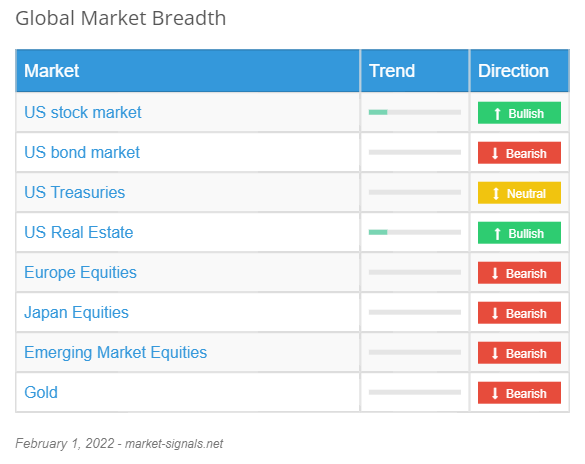This document has been compiled using indicators provided by the Market-Signals trading bot which studies global market data. This document shows the evolution of the strategies proposed by the bot and gives the trends of a selection of ETFs, which follow the main world markets, for February 2022. The strategies hold only long positions. No leverage is used. This document is for information purposes only and should not be taken as investment advice.
Global Market Breadth
| Market | Trend | Direction |
|---|---|---|
| US stock market |
|
|
| US bond market |
|
|
| US Treasuries |
|
|
| US Real Estate |
|
|
| Europe Equities |
|
|
| Japan Equities |
|
|
| Emerging Market Equities |
|
|
| Gold |
|

Portfolios
US Growth Portfolio
T
he portfolio US Growth falls back promptly by 13.48% in January. We find a positive trend in the U.S. equity market however the trend in US stocks ETFs is uncertain, so the portfolio is allocated to a long-term U.S. Treasury Bond ETF (TLT). The asset allocation does not change this month. The level of risk of the strategy for this month is low with a Risk Score in regression of 1 out of 10.
The 1-year performance of this portfolio is 15.42%. Since opening the portfolio at eToro in November 2019, the strategy has performed 72.79%, in comparison, the benchmark asset (S&P 500) has advanced 53.83%. The strategy has suffered a maximum loss of 13.48% since the portfolio opened at eToro, compared to the benchmark asset (S&P 500) which lost 19.44% at maximum.
This strategy captures the U.S. stock market growth for long-term investors who want high returns.
Since inception at eToro
Max drawdown
Since inception at eToro
Portfolio: -13.48%
S&P 500: -19.44%
- eToro portfolio
US Balanced Portfolio
T
he portfolio US Balanced falls back promptly by 10% last month. The strategy combines an allocation in US bonds (30%) with the US Growth portfolio (70%). The trend in the US bond market for February is bearish. The ETF selected in the bond part for this month is IEF. Asset allocation does not change in February. The ETF selected in the portfolio for this month is TLT (33%). The level of risk of the strategy for February is low with a Risk Score in decline of 1 out of 10.
The 1-year performance of this portfolio is 10.04%. Since opening the portfolio at eToro in November 2019, the strategy has performed 48.18%, in comparison, the benchmark asset (S&P 500) has advanced 53.83%. The strategy has suffered a maximum loss of 10% since the portfolio opened at eToro, compared to the benchmark asset (S&P 500) which lost 19.44% at maximum.
This strategy provides a balanced stocks and bonds allocation for investors who want a U.S. market exposure with limited risks.
Global Conservative Portfolio
T
he portfolio Global Conservative collapses distinctly by 7.36% in January. The Strategy combines a multi-market protective asset allocation strategy (Global Stable portfolio 70%) and a US stock market strategy (US Growth portfolio 30%). Asset allocation remains the same this month. The ETF selected in the portfolio for this month is TLT (30%). The degree of risk of the strategy for February is low with a Risk Score in decline of 1 out of 10.
The 1-year trailing return of this portfolio is 5.83%. Since opening the portfolio at eToro in November 2019, the strategy has performed 27.16%, in comparison, the benchmark asset (S&P 500) has advanced 53.83%. The strategy has suffered a maximum loss of 7.39% since the portfolio opened at eToro, compared to the benchmark asset (S&P 500) which lost 19.44% at maximum.
This strategy provides a broad geographic diversification for investors who want an international exposure.
Global Stable Portfolio
T
he portfolio Global Stable falls sharply by 5.16% last month. The overall market trend for this month is negative. By analyzing a diverse multi-market composed of 12 ETFs (stocks, bonds, gold, real estate, international and emerging markets...), we observe that 2 assets only show a positive evolution. Our model allocates 0% to Risk-On assets and 100% to Risk-Off assets. Asset allocation remains the same this month. The portfolio's allocation is 100% cash. The degree of risk of the strategy for February is low with a Risk Score in decline of 0 out of 10.
The 1-year trailing return of this portfolio is 1.14%. Since opening the portfolio at eToro in November 2019, the strategy has performed 10.19%, in comparison, the benchmark asset (Intermediate-term US Treasuries) has advanced 2.42%. The strategy, focused on capital preservation, has suffered a maximum loss of 5.66% since the portfolio opened at eToro in November 2019, compared to the benchmark asset which lost 7.53% at most.
This is the safest strategy, the one with the lowest volatility and the least max drawdown of the 4 offered, that makes this strategy an alternative to a 1-Year Term Deposit.
ETF Trends
SPY SPDR S&P 500 ETF
- S&P 500
The SPY Exchange-Traded Fund from SPDR, which mimics the US large-cap space, collapses distinctly by 5.27% in January. The performance over a period of 1 year of this ETF is 21.35%. The trend in February is weakly positive with a Trend Score in regression of 2 out of 10. The degree of risk of this ETF in this month is high with a Risk Score in rise of 7 out of 10.
VNQ Vanguard Real Estate ETF
- US Real Estate
The VNQ ETF from Vanguard, which follows a broad exposure to U.S. equity REITs, decreases sharply by 8.42% in January. The 1 year trailing return of this equity is 26.19%. The trend in February is weakly bullish with a Trend Score in decline of 2 out of 10. The level of risk of this equity in February is high with a Risk Score in expansion of 7 out of 10.
IWM iShares Russell 2000 ETF
- US Small Cap Equities
The IWM ETF from iShares, which replicates the Russell 2000 Index, collapses distinctly by 9.53% in January. The evolution of the performance of this equity over 1 year is -1.95%. The trend in February is negative. The degree of risk of this equity in February is high with a Risk Score in rise of 8 out of 10.
MDY SPDR S&P Midcap 400
- Midcap 400
The MDY Exchange-Traded Fund from SPDR, which follows the S&P MidCap 400 Index, decreases sharply by 7.27% in January. The performance over a period of 1 year of this Exchange-Traded Fund is 12.94%. The trend in February is bearish. The level of risk of this Exchange-Traded Fund in February is high with a Risk Score in progression of 8 out of 10.
QQQ Invesco QQQ
- Nasdaq 100
The QQQ ETF, which monitors the US tech sector, decreases sharply by 8.75% last month. The evolution of the performance of this ETF over 1 year is 15.61%. The trend in this month is bearish. The level of risk of this ETF in February is high with a Risk Score in progression of 8 out of 10.
EWJ iShares MSCI JAPAN ETF
- Japan Equities
The EWJ ETF from iShares, which replicates the performance of large cap Japanese stocks, decreases sharply by 4.30% in January. The performance over a period of 1 year of this equity is -3.03%. The trend in February is bearish. The degree of risk of this equity in February is medium with a Risk Score in progression of 5 out of 10.
EFA iShares MSCI EAFE ETF
- Europe, Australia and Far East Equities
The EFA ETF, which replicates a broad range of companies in Europe, Australia and the Far East, falls back promptly by 3.63% in January. The performance over a period of 1 year of this equity is 4.17%. The trend in February is bearish. The degree of risk of this equity in February is medium with a Risk Score in growth of 4 out of 10.
VGK Vanguard FTSE Europe ETF
- Europe Equities
The VGK ETF, which measures European Equities, decreases sharply by 3.58% in January. The 1 year trailing return of this equity is 10.17%. The trend in February is bearish. The level of risk of this equity in February is medium with a Risk Score in progression of 5 out of 10.
LQD iShares iBoxx $ Investment Grade Corporate Bond
- US Corporate Bonds
The LQD ETF, which monitors a basket of U.S. corporate bonds, falls sharply by 3.59% in January. The performance over a period of 1 year of this ETF is -5.93%. The trend in February is bearish. The level of risk of this ETF in February is low with a Risk Score in rise of 3 out of 10.
TLT iShares 20+ Year Treasury Bond ETF
- Long-Term US Treasuries
The TLT ETF, which mimics the U.S. long-term treasury market, falls back promptly by 3.91% last month. The performance over a period of 1 year of this ETF is -6.58%. The trend in this month is negative. The degree of risk of this ETF in this month is low with a Risk Score in regression of 2 out of 10. This ETF is present in the portfolios US Growth, Global Conservative and US Balanced in February.
EEM iShares MSCI Emerging Markets ETF
- Emerging Market Equities
The EEM ETF, which follows a diversified exposure to emerging markets, dropped 0.02% in January. The 1 year trailing return of this equity is -9.43%. The trend in February is bearish. The level of risk of this equity in February is medium with a Risk Score in rise of 4 out of 10.
BND Vanguard Total Bond Market ETF
- US Total Bond Market
The BND Exchange-Traded Fund from Vanguard, which replicates a broad, US market-weighted bond index, fell 2.06% in January. The performance over a period of 1 year of this Exchange-Traded Fund is -4.60%. The trend in February is bearish. The degree of risk of this Exchange-Traded Fund in February is low with a Risk Score in progression of 3 out of 10.
IEF iShares 7-10 Year Treasury Bond ETF
- Intermediate-term US Treasuries
The IEF ETF, which tracks intermediate-term U.S. Treasury bonds, decreased 2.11% in January. The 1 year trailing return of this ETF is -5.08%. The trend in February is negative. The degree of risk of this ETF in February is low with a Risk Score in growth of 2 out of 10.
JNK SPDR Bloomberg High Yield Bond
- High Yield Bonds
The JNK ETF, which measures US high yield bonds, decreased 2.76% in January. The 1 year trailing return of this equity is -2.78%. The trend in February is bearish. The level of risk of this equity in February is low with a Risk Score in growth of 3 out of 10.
GLD SPDR Gold
- Gold
The GLD ETF, which mimics the performance of gold in the commodities market, fell 1.68% in January. The 1 year trailing return of this equity is -2.33%. The trend in February is bearish. The degree of risk of this equity in February is low with a Risk Score stable of 2 out of 10.
Compliance disclaimer
This communication is for information and education purposes only and should not be taken as investment advice, a personal recommendation,
or an offer of, or solicitation to buy or sell, any financial instruments.
Natevia makes no representation and assumes no liability as to the accuracy or completeness of the content of this publication,
which has been prepared utilizing publicly-available information.
Past Performance is not indicative of future results.














